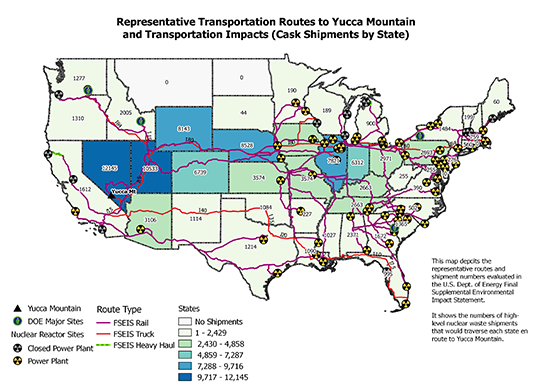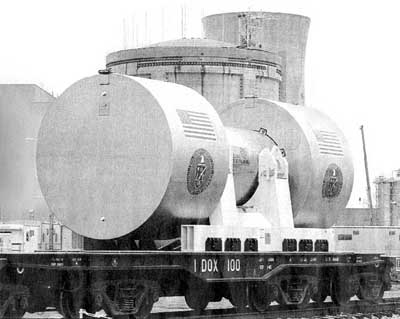
The Stop Fukushima Freeways Campaign shows the perils of the massive and unnecessary radioactive waste transportation that would occur across the U.S. if the moribund and scientifically-indefensible Yucca Mountain, Nevada waste dump were to be revived. Such large-scale transport would also occur if, as some in Congress advocate, a “centralized interim storage” site for high-level radioactive waste were created. In that case, the waste would either have to move twice (once to the interim site, and then to a permanent site), thus doubling the risks, or the “interim” site would become a de facto permanent waste dump–without going through the necessary scientific characterization.
The solution to the radioactive waste problem begins with ending its generation as quickly as possible. And we work non-stop to acheive that goal. But for the highly radioactive waste that exists and continues to be produced, putting it on trucks, train cars and barges and transporting it across the country to a scientifically-indefensible site solely for the benefit of the nuclear power industry is an unacceptable risk to our cities, our communities, our agricultural heartland, our entire nation.
Twenty years ago, the Stop Mobile Chernobyl Campaign was launched to defeat a similar Congressional effort to open Yucca Mountain and/or establish a “centralized interim storage” site and thus begin a national radioactive waste transportation program. That campaign ultimately led to a veto by President Bill Clinton of such legislation that was sustained in the Senate by one vote.
Campaign Actions and Updates
This campaign launched with a coordinated national media release on October 27, 2015. See below for articles on the issue resulting for the launch. Please contact Mary Olson at NIRS Southeast office for more information.
D.C. Area Press Release: October 27, 2015. Stop Fukushima Freeways Campaign kicks off; 250 shipments of lethal radwaste expected through DC metro area.
Fukushima Freeways Briefing Book for local decision-makers and concerned citizens on the transportation of highly radioactive “spent” nuclear fuel via road, rail and barge across 43 states. Urge your local governing body to pass a resolution in opposition to unsafe and unnecessary radioactive waste transportation.
PDF download.
PowerPoint download: Download, add your group’s contact information, post online and distribute to your elected officials.
FLASH VIDEO: Stop Fukushima Freeways. Two minute basic introduction to campaign by Three Mile Island Alert’s Scott Portzline. Please spread widely on social media: http://tinyurl.com/flashstopfukushimafreeways
Talking Points/Media Documents
Talking points on maps and nuclear waste transport to Yucca Mountain.
Tips for Contacting Media: Some ideas on crafting your message and how to find media contacts.
Educational and Organizing Resources
Are your emergency responders prepared for a radioactive waste accident? Download, print, and distribute this full-color brochure!
Get the facts on property values and nuclear waste transportation. Download, print and distribute our full-color brochure!
The HOSS principles. More than 200 clean energy, environmental, and consumer groups have signed on to the HOSS (Hardened On-Site Storage) principles as the most reasonable option to store radioactive waste at present. These principles call for high-level radioactive waste to be stored at the point of generation, in dry casks, hardened and bermed to help secure them from natural disasters and deliberate attacks, until a moral and scientifically sound permanent solution for radioactive waste has been established.
Transporting Nuclear Materials: Design, Logistics, and Shipment. (US House Energy and Commerce Committee Hearing on Nuclear Waste Transport held on October 1, 2015)
Written testimony of Kevin Kamps of Beyond Nuclear presented at October 1, 2015 House Energy and Commerce Committee.
Reuters footage of Union Pacific derailment in Texas due to flooding. What if this train were carrying highly radioactive waste?
Hot Cargo: Nuclear Waste Transport Fact Sheet
High-Level Radioactive Waste Fact Sheet
Talking Points on Yucca Mountain
Presentation on the Geology of the Proposed Yucca Mountain Site
Why Radiation from Routine Shipment of Radioactive Waste is a Local Concern
NIRS’ Mobile Chernobyl campaign page, including background info, history, more resources on radioactive waste transport, and more from this successful campaign from 1994-2014.
Expert and Technical Documents
Worst Case for Nuclear Waste Transport Accident. Dr Marvin Resnikoff
Radiation Exposures from Nuclear Waste Transport. Robert Halstead, State of Nevada
Radiological Consequences of a Severe Rail Accident in a Tunnel. Dr. Marvin Resnikoff
Yucca Mountain Transportation Issues. A presentation by Fred Dilger, PhD., a consultant to the State of Nevada, February 2015.
Appendix G: Transportation from the Department of Energy’s 2002 Environmental Impact Statement on the proposal for a nuclear waste repository at Yucca Mountain. This appendix to the EIS is difficult to find online, so we have posted it here. Large file (250 pages, 11 mb).
Maps and Statistics
Road and Rails transport. This link takes you to a publication from the State of Nevada, which includes transport maps for every state. We will post individual state maps separately when those are available.
- Virginia barge fact sheet
- Tennessee barge fact sheet
- New York tri-state area barge fact sheet
- Michigan barge fact sheet
- Nebraska barge fact sheet
- Massachusetts barge fact sheet
- Maryland barge fact sheet
- Mississippi barge fact sheet
- Florida barge fact sheet
- Deleware barge fact sheet
- California barge fact sheet
Full-size national transportation map to download, right click and choose “save image.”
This sheet, excerpted from the State of Nevada report, shows the number of casks, by road and rail, that would be shipped from each state under a full-scale atomic waste transportation program. The cover page of that report for citation purposes.
Press Coverage
Thank you to everyone who participated in the October 27 launch of the Stop Fukushima Freeways Campaign! The response was terrific, with articles appearing in media outlets across the country. Here is a partial list:
Chattanooga Free Press
Sohn: There is no good answer for storing nuclear waste
Pahrump Valley Times (close to Yucca Mountain)
Amargosa Conservancy voices concerns over nuclear waste shipments
E & E News Article
Democrats united against omnibus riders — Reid
Fox 5 News Las Vegas
Vegas mayor vocalizes opposition to nuclear waste transport
Nuclear Watch South
Press event and photo op
Atlanta Journal Constitution
Nuclear waste transportation: Is Georgia at risk?
The Buffalo News
Tighter regulations must be in place before shipments of nuclear waste begin
Palm Beach Post
Stop Fukushima Freeways launches campaign against Yucca Mountain
The Epoch Times
Anti-Nuclear Group Mobilizes Against Proposed Nuclear Waste Transportation
Sierra Sun Times
New Campaign to Stop ‘Fukushima Freeways’ Kicks Off
The Daily Sentinel: Grand Junction, Colorado
Groups cry foul over possible nuke-waste routes
The News-Messenger
Nuclear transport in Ohio disputed
News Herald
Group opposes nuke waste shipments through Port Clinton
The Spectrum
Group fighting proposed revival of Yucca Mountain
Fox 5 News Nashville
Environmentalist Group Warns Of Trains Carrying Nuclear Waste — Sky Arnold




